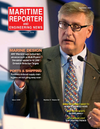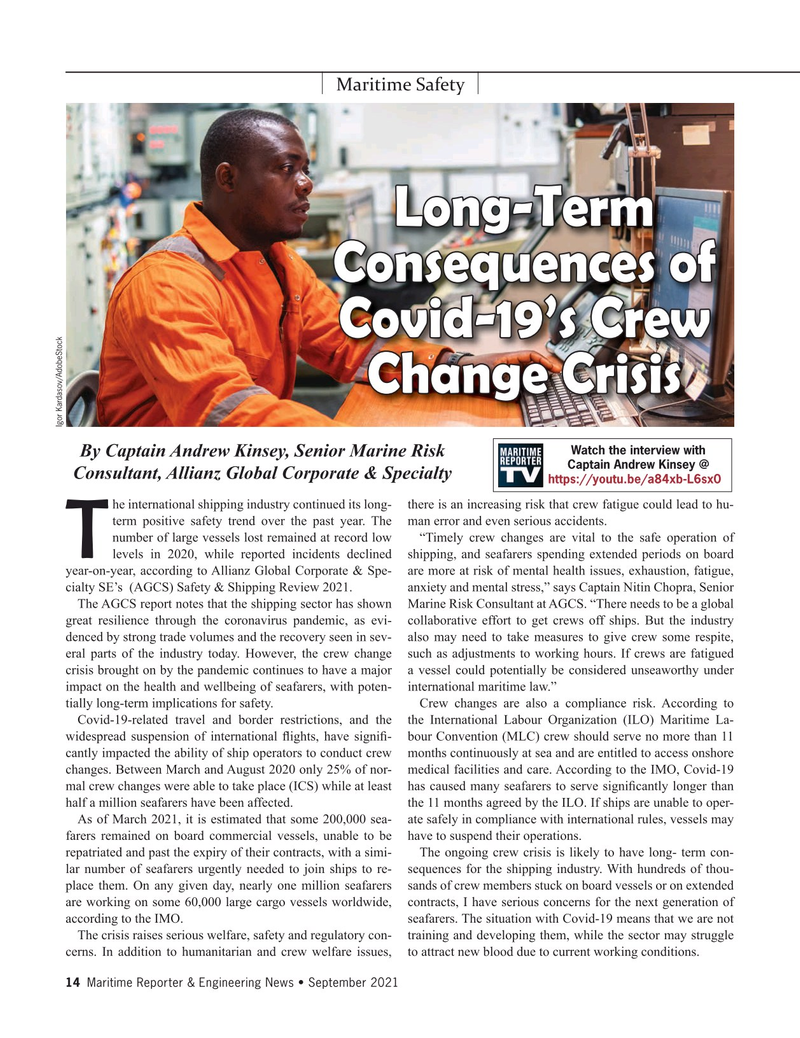
Page 14: of Maritime Reporter Magazine (September 2021)
The Marine Design Edition
Read this page in Pdf, Flash or Html5 edition of September 2021 Maritime Reporter Magazine
Maritime Safety
Long-Term
Consequences of
Covid-19’s Crew
Change Crisis
Igor Kardasov/AdobeStock
Watch the interview with
By Captain Andrew Kinsey, Senior Marine Risk
Captain Andrew Kinsey @
Consultant, Allianz Global Corporate & Specialty https://youtu.be/a84xb-L6sx0 he international shipping industry continued its long- there is an increasing risk that crew fatigue could lead to hu- term positive safety trend over the past year. The man error and even serious accidents.
number of large vessels lost remained at record low “Timely crew changes are vital to the safe operation of
T levels in 2020, while reported incidents declined shipping, and seafarers spending extended periods on board year-on-year, according to Allianz Global Corporate & Spe- are more at risk of mental health issues, exhaustion, fatigue, cialty SE’s (AGCS) Safety & Shipping Review 2021. anxiety and mental stress,” says Captain Nitin Chopra, Senior
The AGCS report notes that the shipping sector has shown Marine Risk Consultant at AGCS. “There needs to be a global great resilience through the coronavirus pandemic, as evi- collaborative effort to get crews off ships. But the industry denced by strong trade volumes and the recovery seen in sev- also may need to take measures to give crew some respite, eral parts of the industry today. However, the crew change such as adjustments to working hours. If crews are fatigued crisis brought on by the pandemic continues to have a major a vessel could potentially be considered unseaworthy under impact on the health and wellbeing of seafarers, with poten- international maritime law.” tially long-term implications for safety. Crew changes are also a compliance risk. According to
Covid-19-related travel and border restrictions, and the the International Labour Organization (ILO) Maritime La- widespread suspension of international ? ights, have signi? - bour Convention (MLC) crew should serve no more than 11 cantly impacted the ability of ship operators to conduct crew months continuously at sea and are entitled to access onshore changes. Between March and August 2020 only 25% of nor- medical facilities and care. According to the IMO, Covid-19 mal crew changes were able to take place (ICS) while at least has caused many seafarers to serve signi? cantly longer than half a million seafarers have been affected. the 11 months agreed by the ILO. If ships are unable to oper-
As of March 2021, it is estimated that some 200,000 sea- ate safely in compliance with international rules, vessels may farers remained on board commercial vessels, unable to be have to suspend their operations.
repatriated and past the expiry of their contracts, with a simi- The ongoing crew crisis is likely to have long- term con- lar number of seafarers urgently needed to join ships to re- sequences for the shipping industry. With hundreds of thou- place them. On any given day, nearly one million seafarers sands of crew members stuck on board vessels or on extended are working on some 60,000 large cargo vessels worldwide, contracts, I have serious concerns for the next generation of according to the IMO. seafarers. The situation with Covid-19 means that we are not
The crisis raises serious welfare, safety and regulatory con- training and developing them, while the sector may struggle cerns. In addition to humanitarian and crew welfare issues, to attract new blood due to current working conditions.
14 Maritime Reporter & Engineering News • September 2021
MR #9 (1-17).indd 14 9/7/2021 9:24:20 AM

 13
13

 15
15
